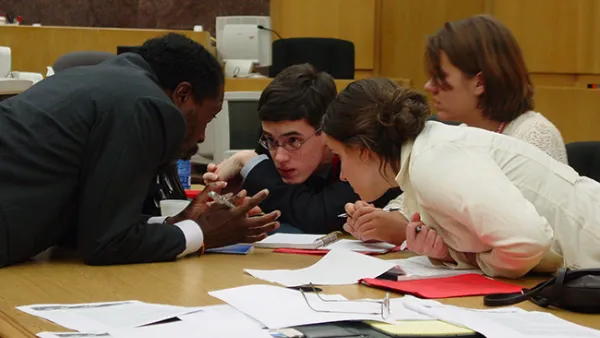Among other cherished values, the First Amendment protects freedom of speech. The U.S. Supreme Court often has struggled to determine what exactly constitutes protected speech. The following are examples of speech, both direct (words) and symbolic (actions), that the Court has decided are either entitled to First Amendment protections, or not.
The First Amendment states, in relevant part, that:
“Congress shall make no law...abridging freedom of speech.”
Freedom of speech includes the right:
-
Not to speak (specifically, the right not to salute the flag).
West Virginia Board of Education v. Barnette, 319 U.S. 624 (1943). -
Of students to wear black armbands to school to protest a war (“Students do not shed their constitutional rights at the schoolhouse gate.”).
Tinker v. Des Moines, 393 U.S. 503 (1969). -
To use certain offensive words and phrases to convey political messages.
Cohen v. California, 403 U.S. 15 (1971). -
To contribute money (under certain circumstances) to political campaigns.
Buckley v. Valeo, 424 U.S. 1 (1976). -
To advertise commercial products and professional services (with some restrictions).
Virginia Board of Pharmacy v. Virginia Consumer Council, 425 U.S. 748 (1976); Bates v. State Bar of Arizona, 433 U.S. 350 (1977). -
To engage in symbolic speech, (e.g., burning the flag in protest).
Texas v. Johnson, 491 U.S. 397 (1989); United States v. Eichman, 496 U.S. 310 (1990).
Freedom of speech does not include the right:
-
To incite imminent lawless action.
Brandenburg v. Ohio, 395 U.S. 444 (1969). -
To make or distribute obscene materials.
Roth v. United States, 354 U.S. 476 (1957). -
To burn draft cards as an anti-war protest.
United States v. O’Brien, 391 U.S. 367 (1968). -
To permit students to print articles in a school newspaper over the objections of the school administration.
Hazelwood School District v. Kuhlmeier, 484 U.S. 260 (1988). -
Of students to make an obscene speech at a school-sponsored event.
Bethel School District #43 v. Fraser, 478 U.S. 675 (1986). -
Of students to advocate illegal drug use at a school-sponsored event.
Morse v. Frederick, __ U.S. __ (2007).
Disclaimer: These resources are created by the Administrative Office of the U.S. Courts for use in educational activities only. They may not reflect the current state of the law, and are not intended to provide legal advice, guidance on litigation, or commentary on legislation.
Activities for Students
True-to-life court simulations focus on Bill of Rights cases with teen-relevant scenarios.

